Marriage News Blog
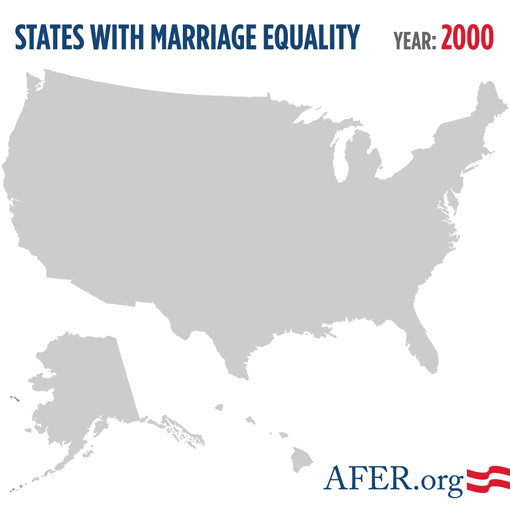
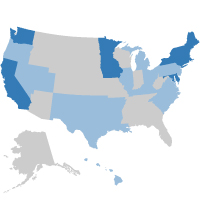 After the historic Supreme Court victories in June that paved the way for marriage equality in California and for all legally married couples to receive federal benefits, there is renewed energy from coast to coast to increase the number of states where gay and lesbian couples can get married.
After the historic Supreme Court victories in June that paved the way for marriage equality in California and for all legally married couples to receive federal benefits, there is renewed energy from coast to coast to increase the number of states where gay and lesbian couples can get married.
Which will be the next state to allow gay and lesbian couples the freedom to get married? Here are the ones with active court cases, legislation and ballot initiatives that could expand the number of states with marriage equality.
Special thanks to Kathleen Perrin at Equality Case Files for her research assistance.
Hawaii
 What: Legislation & Federal Court Case
What: Legislation & Federal Court Case
Case: Jackson v. Abercrombie
Status: Ninth Circuit Court of Appeals, briefing completed by November 1
Marriage equality legislation will be considered by the Hawaii Legislature on October 28. The┬ĀHonolulu Civil Beat reports┬Āthat the bill has enough support to pass, but the vote could be close.
There is also a federal court case that was filed in December 2011 that is working its way up the courts. ┬ĀNatasha Jackson and Janin Kleid allege that HawaiiŌĆÖs marriage statute violates the Due Process and Equal Protection Clauses of the Fourteenth Amendment to the United States Constitution.
Hawaii was the first battleground state, when a ┬Ālawsuit in the 1990s prompted a ballot initiative that gave the stateŌĆÖs legislature the power to decide who is able to get married in the state. Click here to get a rundown of marriage history in the state >
Governor Neil Abercrombie refused to defend the law in court, but Director of Health Loretta J. Fuddy took up the case. She is represented by the stateŌĆÖs attorney general. The Hawaii Family Forum, a socially conservative organization represented by the Alliance Defending Freedom, was permitted to intervene.
On August 7, 2012 the District Court issued a 117-page decision rejecting plaintiffsŌĆÖ constitutional challenge. The Plaintiffs, joined by Governor Neil Abercrombie, appealed to the Ninth Circuit Court of Appeals.┬Ā On January 7, 2013, the Ninth Circuit ordered the Jackson appeals to be heard before the same merits panel that considers the Sevcik v. Sandoval appeal out of Nevada. On June 28, 2013, the Supreme Court having decided Perry and Windsor, the Ninth Circuit issued an amended briefing schedule.┬Ā Briefing is expected to be completed by December.
Nevada
 Type: Federal Court Case & Legislation
Type: Federal Court Case & Legislation
Case: Sevcik v. Sandoval
Status: Briefing before the Ninth Circuit Court of Appeals
In April 2010, eight gay and lesbian couples, represented by attorneys at Lambda Legal, and pro bono co-counsel from OŌĆÖMelveny & Myers LLP and Snell & Wilmer LLP, filed suit against Nevada Governor Brian Sandoval and the Clerk of Clark County, the Clerk of Washoe County, and the Clerk-Recorder of Carson City.
While NevadaŌĆÖs constitution prohibits the recognition of marriage for gay and lesbian couples, the state has offered limited domestic partner protections to all residents (both gay and straight) since 2009. The plaintiffs argue that the stateŌĆÖs unequal treatment of gay and lesbian couples violates the Equal Protection Clause of the Fourteenth Amendment.
Governor Sandoval is represented by Nevada Attorney General Catherine Cortez Masto. The Coalition for the Protection of Marriage, a socially conservative Nevada non-profit, was able to intervene.
On November 29, 2013, the District Court granted summary judgment in favor of the state defendants, upholding the stateŌĆÖs discriminatory law. Several days later, the Coalition for the Protection of Marriage asked the U.S. Supreme Court to hear the case. Their petition was denied without comment on June 27, 2013.
The Plaintiffs have appealed to the Ninth Circuit Court of Appeals. The case will be heard alongside the Hawaii case Jackson v Abercrombie. Briefing is expected to be completed by December 2013.
On the legislative front, a bill that would put a marriage equality initiative before the voters cleared the State Legislature in May 2013 with bipartisan support.┬Ā However, it must also get approval from the 2015 Legislature before being placed on the ballot in 2016.
Learn more about Sevcik v. Sandoval >
Oklahoma
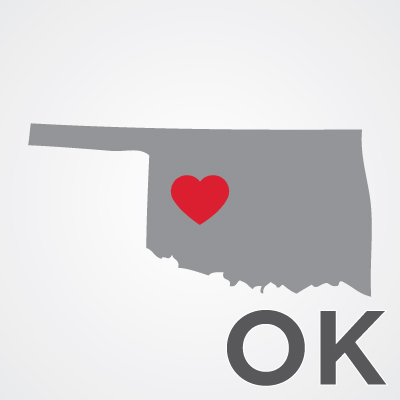 Type: Federal Court Case
Type: Federal Court Case
Case: Bishop v. United States
Status: District Court motions for summary judgment pending
After JuneŌĆÖs marriage equality victories at the Supreme Court, a 2004 case in Oklahoma has gotten new life. Two lesbian couples from Tulsa County, Mary Bishop & Sharon Baldwin (who are not married) and Susan G. Barton & Gay E. Phillips (who were married in California in 2008), are challenging not only Oklahoma’s ban on same-sex marriage but also a crucial part of DOMA not addressed in the Supreme Court’s recent DOMA ruling, Section 2, which “allows states not to recognize gay marriages performed in other states.” The Tenth Circuit Court of Appeals remanded the case back to the District Court because of standing issues in 2009. The plaintiffs have since amended the original complaint.
Defendants are the United States and Sally Howe-Smith, the Tulsa County Clerk of Court.┬Ā Because President Obama and Attorney General Holder have concluded that Section 3 of DOMA is unconstitutional, the Bipartisan Legal Advisory Group of the United States House of Representatives has intervened to defend Section 3.┬Ā However, the United States is also asking to be dismissed as a defendant, arguing that the State should defend Section 2 of DOMA. Because Section 2 says that states do not have to recognize out-of-state marriages of gay and lesbian couples and because Oklahoma chooses not to recognize the marriages of gay and lesbian couples, the Justice Department argues that Oklahoma┬Āshould defend the law, not the federal government. ┬ĀMs. Howe-Smith is represented by the Tulsa County District AttorneyŌĆÖs Office and attorneys from the Alliance Defending Freedom.
Cross-motions for summary judgment are currently pending.┬Ā Also pending is the United StatesŌĆÖ motion to dismiss plaintiffsŌĆÖ claim against Section 2 of DOMA for lack of jurisdiction.┬Ā On July 16, 2013, plaintiffs moved for supplemental briefing in light of the Supreme CourtŌĆÖs decision in United States v. Windsor.
Michigan
 Type: Federal District Court Case & Ballot Initiative Legislation
Type: Federal District Court Case & Ballot Initiative Legislation
Case: DeBoer v. Snyder
Status: Oral augments on motions for summary judgment scheduled for October 1, 2013
When nurses April DeBoer and Jayne Rowse filed a lawsuit in January 2012 challenging MichiganŌĆÖs ban on joint adoption by unmarried couples, it was to keep their 3 children together. At an August hearing on the stateŌĆÖs motion to dismiss their challenge, Senior United States District Judge Bernard A. Friedman, who was appointed by President Reagan in 1988, opined from the bench that MichiganŌĆÖs constitutional ban on gay marriage is ŌĆ£the underlying issueŌĆØ in the case, and gave the plaintiffs ten days to file an amended complaint challenging the marriage amendment. They did and now the federal court will hear oral argument about motions for summary judgment on October 1, 2013.
Legislation to put a marriage equality initiative on the ballot was introduced in June 2013, but is unlikely to go anywhere in the Republican-dominated Legislature.
Utah
 Type: Federal District Court Case
Type: Federal District Court Case
Case: Kitchen v. Herbert
Status: Schedule for next steps pending
Three couples are challenging UtahŌĆÖs statutory and constitutional provisions banning marriage equality.┬Ā They filed their complaint on March 25, 2013, naming as defendants Governor Gary R. Herbert, Attorney General John Swallow, and Salt Lake County Clerk Sherrie Swensen.┬Ā The case is currently being briefed.
Pennsylvania
 Type: Federal District Court Case
Type: Federal District Court Case
Cases: Whitewood v. Corbett and Commonwealth v. Hanes
Status: A scheduling conference is set for September 30, 2013
Six lesbian and gay couples, represented by the ACLU and attorneys from Hangley Aronchick Segal Pudlin & Schiller, are challenging the stateŌĆÖs┬Ā statutes forbidding marriage equality and refusing to recognize out-of-state marriages of gay and lesbian couples. Attorney General Kathleen Kane said she would not defend the stateŌĆÖs marriage laws because she believed them to be unconstitutional. Additional named defendants include Governor Tom Corbett, Secretary of Public Health Michael Wolf, Washington County Register of Wills Mary Jo Poknis, and Bucks County Register of Wills and Clerk of OrphansŌĆÖ Court Donald Petrille, Jr. A scheduling conference is set for September 30, 2013.
Montgomery County Register of Wills D. Bruce Hanes began issuing marriage licenses to gay and lesbian couples on July 23. The State Department of Health filed a lawsuit to block the action. On September 12, a Commonwealth judge agreed and ordered the clerk to stop issuing licenses, but did not rule on the validity of the over 170 licenses that have been issued or the constitutionality of PennsylvaniaŌĆÖs marriage ban.
Arkansas
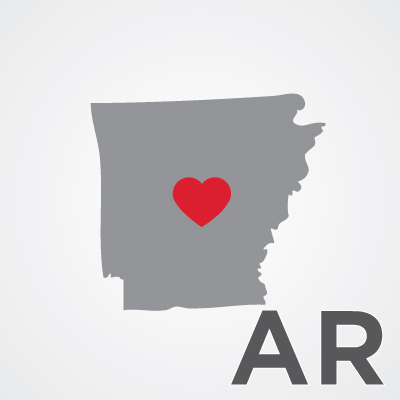 Type: Cases in Federal District Court and State Court
Type: Cases in Federal District Court and State Court
Cases: Jernigan v. Crane and Wright v. State of Arkansas
Status: Complaints filed
Two lesbian couples who wish to marry and one married gay couple filed a case in federal court challenging the stateŌĆÖs constitutional amendment and statutes banning the recognition of marriage for gay and lesbian couples in the state. The named defendants are Governor Mike Beebe, Attorney General Dustin McDaniel, and Circuit and County Clerk for Pulaski County Larry Crane.
In a second case in state court, Wright v. State of Arkansas, several gay and lesbian couples and their children are suing the state because they believe the stateŌĆÖs marriage bans violate the Full Faith and Credit Clause and the Due Process and Equal Protection Clauses of the Fourteenth Amendment to the United States Constitution and the Declaration of Rights of the Arkansas Constitution.
Virginia
 Type: Federal District Court Cases
Type: Federal District Court Cases
Cases: Harris v. McDonnell and Bostic v. McDonnell
Status: Complaints filed
Lambda Legal and the ACLU filed a federal class action lawsuit seeking the freedom to marry for all gay and lesbian couples in Virginia as well as an end to the stateŌĆÖs refusal to recognize out-of-state marriages. The case, Harris v. McDonnell, was filed on behalf of two couples, Joanne Harris & Jessica Duff and Christy Berghoff & Victoria Kidd.
A second case, Bostic v. McDonnell, was filed on July 15, 2013 on behalf of Timothy Bostic and Tony London, a gay couple who wishes to marry.
Ohio
 Type: Federal District Court Case & Proposed Ballot Initiative
Type: Federal District Court Case & Proposed Ballot Initiative
Case: Obergefell v. Kasich
Status: Oral argument on a motion for summary judgment scheduled for December 18.
James Obergefell and John Arthur have been together for more than 20 years. They flew to Maryland in July to get married because John suffers from amyotrophic lateral sclerosis (ŌĆ£ALSŌĆØ or ŌĆ£Lou GehrigŌĆÖs diseaseŌĆØ) and is in hospice care. The couple sued to have their marriage recognized so that James can be listed as the surviving spouse on JohnŌĆÖs death certificate. District Court Judge Timothy S. Black granted their preliminary injunction asking for their marriage to be recognized, noting that plaintiffs:
ŌĆ£have established a substantial likelihood that they will prevail at trial on their claim that by treating lawful same sex marriages differently than it treats lawful opposite sex marriages ŌĆ” Ohio law, as applied here, violates the United States Constitution which guarantees that ŌĆśNo State shall make or enforce any law which shall … deny to any person within its jurisdiction equal protection of the laws.ŌĆÖŌĆØ
The couple is also joined by David Brian Michener of Cincinnati. On September 3, the federal court granted MichenerŌĆÖs request to have his marriage recognized so that he can be listed on his late husbandŌĆÖs death certificate. The couple was married in Delaware on July 22 and have three adopted children.
Oral argument on a motion for summary judgment is scheduled for December 18.
Additionally, a coalition of pro-marriage groups called Freedom Ohio is attempting to collect approximately 386,000 signatures to get a measure on the November 2014 ballot to repeal the stateŌĆÖs constitutional ban.
North Carolina
 Type: Federal Court Case
Type: Federal Court Case
Case: Fisher-Borne v. Smith
Status: Complaint filed July 19, 2013, final brief due November 15, 2013
Six couples, represented by the ACLU and attorneys from Ellis & Winters LLP and Sullivan & Cromwell LLP, are challenging the stateŌĆÖs strict marriage ban. First amended complaint filed on July 19, 2013.
South Carolina
 Type: Federal Court Case
Type: Federal Court Case
Case: Bradacs v. Haley
Status: Complaint filed August 28, 2013
Katherine Bradacs, a South Carolina Highway Patrol trooper, and Tracie Goodwin, a disabled U.S. Air Force veteran, filed a case in federal court challenging the stateŌĆÖs ban on marriage for gay and lesbian couples. The couple was married in Washington, D.C. in 2012.
Voters in the state passed a state law banning marriage for gay couples in 1996. A similar constitutional amendment was passed in 2006. The named defendants are Governor Nikki Haley and State Attorney General Alan Wilson, in their official capacities.
Kentucky
 Type: Federal & State Court Cases
Type: Federal & State Court Cases
Case: Bourke v. Breshear and Kentucky Equality Federation v. Commonwealth of Kentucky
Status: Complaints filed on July 26, 2013 and September 12, 2013
Greg Bourke and Michael DeLeon were married nine years ago in Canada and have filed a federal court case challenging the state ban that prohibits their marriage from being recognized. The couple has two adopted children.
In September the Kentucky Equality Federation filed a lawsuit in state court, claiming that the stateŌĆÖs 2004 marriage ban amendment violates multiple sections of the Kentucky Constitution that guarantee citizens equal protection under the law.
New Mexico
 Type: State Court Cases
Type: State Court Cases
Cases: Several cases
Status: Hearing before New Mexico Supreme Court on October 23
Gay and lesbian couples are able to get married in eight of New MexicoŌĆÖs 33 counties. In four counties, clerks were ordered by the courts to issue marriage licenses.
Now the New Mexico Supreme Court said it will weigh in when it considers the issue on October 23. All of the stateŌĆÖs 33 county clerks asked the high court to decide whether a variety of lower court rulings should apply statewide.
A Bernalillo County judge in August found that prohibitions on allowing gay and lesbian couples to marry in the state ŌĆ£are unconstitutional and unenforceable.ŌĆØ He found that:
ŌĆ£Gay and lesbian citizens of New Mexico have endured a long history of discrimination. Denial of the right to marry continues this unfortunate, intolerable pattern and establishes irreparable injury on plaintiffsŌĆÖ part.ŌĆØ
One of the first couples married in Santa Fe was Jen Roper and Angelique Neuman. The couple cannot travel to another state to get married because Jen has terminal brain cancer.
Meanwhile, several Republican legislators have filed a lawsuit, Sharer v. Ellins, in Do├▒a Ana County aimed at halting marriages for gay and lesbian couples across the state and invalidating the ones that have already taken place.
In January, Attorney General Gary King stated that he believed out of state marriages are recognized by the state, though he said he could not predict how the State Supreme Court would rule on the issue.
Legislation that would put the issue to voters failed in committee in February 2013. Two bills were introducedŌĆöone that would recognize marriage equality and one that would ban it.
Illinois
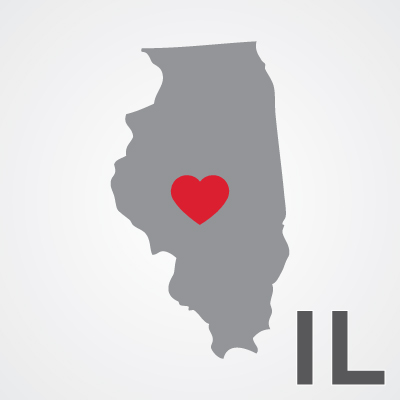 Type: State Court Cases and Legislation
Type: State Court Cases and Legislation
Case: Darby v. Orr and Lazarro v. Orr
Status: Motion for summary judgment pending, vote in the House of Representatives pending
The Land of Lincoln adopted civil unions in June 2011. Two consolidated lawsuits, one filed by Lambda Legal in May 2012 on behalf of 16 gay and lesbian couples and their children, and another filed in March 2013 by the ACLU of Illinois on behalf of nine couples, seek the freedom to marry in state court.
On August 6, 2013, Circuit Court of Cook County heard oral arguments in a motion by the anti-marriage organization Thomas More Society seeking to dismiss the cases. The judge said sheŌĆÖll rule on the motion by the end of September. Lambda Legal and the ACLU of Illinois also filed a motion for summary judgment, which is also pending.
Marriage equality legislation was passed by the State Senate in February 2013 but was not called for a vote in the House of Representative before it adjourned on May 31.┬Ā The bill may be called for a vote in October or November.
Texas
 Type: State Court Cases
Type: State Court Cases
Cases: In re Marriage of J.B. and H.B. and State of Texas v. Naylor
Status: Fully briefed before the Texas State Supreme Court. The Court will hear oral argument in In re Marriage of J.B. and H.B. on November 5.
A gay couple known as J.B. and H.B. were married in Massachusetts and filed for divorce in Texas trial court in January 2009. The attorney general intervened. The trial court held that TexasŌĆÖs constitutional and statutory provisions banning gay marriage violate the Equal Protection Clause of the United States Constitution insofar as they prohibit J.B. and H.B. to obtain a divorce. This decision was then overturned by the Texas Court of Appeals for the Fifth District, which ruled that the state trial courts lack jurisdiction to hear same-sex divorce cases and that the stateŌĆÖs marriage bans do not violate the Equal Protection Clause.
The State Supreme Court is also considering a case dealing with the divorce of Angelique Naylor and Sabina Daly who were married in Massachusetts in 2004. The Travis County District Court granted the two women a divorce in 2004 but the State intervened and appealed. The Texas Court of Appeals for the Third District then dismissed the appeal holding that the State lacked standing. The Court also noted that ŌĆ£there are interpretations of [Texas Family Code] section 6.204 that would allow the trial court to grant the divorce without finding the statute unconstitutional.ŌĆØ
Both cases are fully briefed before the Texas State Supreme Court. The Court will hear oral argument in In re Marriage of J.B. and H.B. on November 5.
New Jersey
 Type: State Court Case and Legislation
Type: State Court Case and Legislation
Case: Garden State Equality v. Dow
Status: Motion for summary judgment pending in Superior Court
On October 25, 2006, the Supreme Court of New Jersey decided Lewis v. Harris.┬Ā The Court held that, in order to comply with the New Jersey ConstitutionŌĆÖs equal protection guarantee, the State must provide gay and lesbian couples with equal rights and benefits of marriage through either amending the marriage statutes to include same-sex couples or enact a parallel statutory structure by another name. Civil union legislation went into effect in 2007.
In June 2011, Garden State Equality and several gay and lesbian couples and their children filed suit, arguing that civil unions are insufficient and do not provide the same kind of protections and recognition that marriage does. Citing the United States Supreme CourtŌĆÖs recent decision in United States v. Windsor, plaintiffs filed a motion for summary judgment on July 3, which is now pending. Marriage equality legislation was passed by the Legislature in February 2012 but vetoed by Gov. Christie. In July 2013, a coalition founded by Garden State Equality and the ACLU of New Jersey called New Jersey United for Marriage announced it would secure the votes needed to override Gov. ChristieŌĆÖs veto.
Oregon
 Type: Proposed Ballot Initiative
Type: Proposed Ballot Initiative
Status: Signature gathering underway
Signature gathering is underway to qualify a marriage equality ballot initiative for the November 2014 election. In the first 12 days of canvassing, nearly one third of the required signatures were collected by more than 1,700 volunteers.┬Ā The state has had domestic partnerships since 2008. Learn more >
